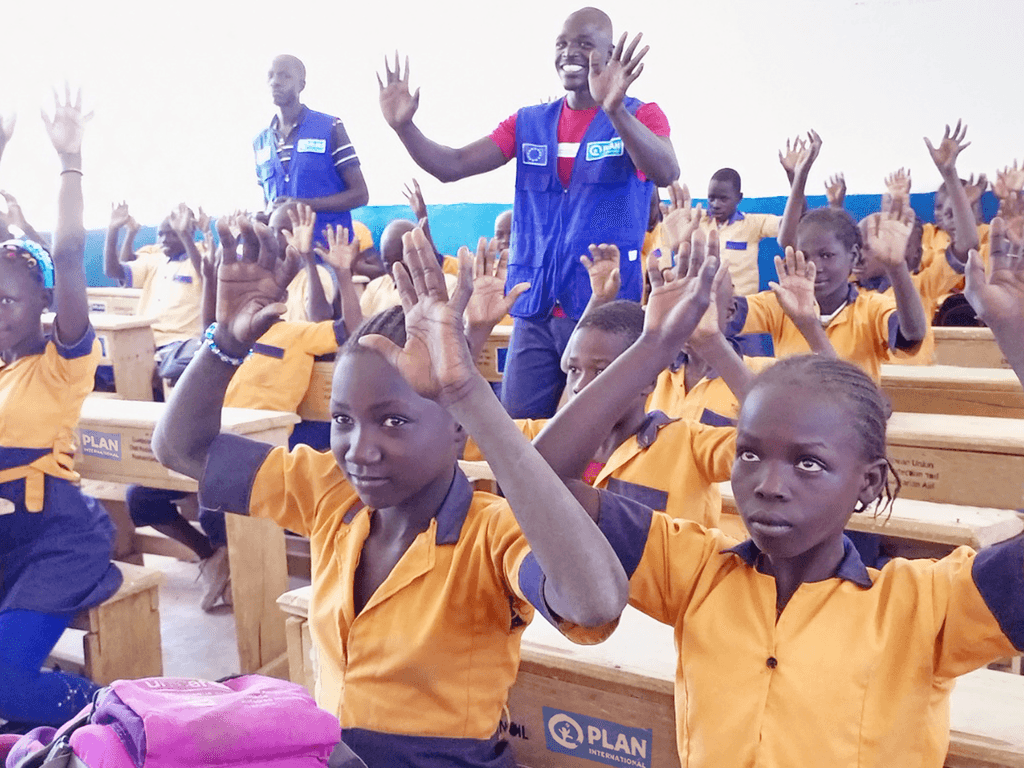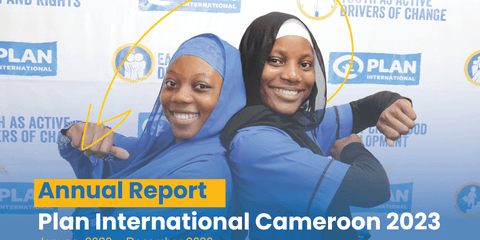17 JANUARY 2024
In Cameroon, more than 1.4 million school-age children are in need of assistance due to insecurity and disasters linked to climate change. A milestone of 4000 students have been supported to return to school through Plan International Cameroon’s Accelerated Education Programme and this number continues to rise.

In Cameroon, more than 1.4 million school-age children are in need of assistance due to insecurity and disasters linked to climate change. Many are also victims of the security crisis affecting the Lake Chad region since 2018. Each school year missed increases the likelihood that these learners will never return to formal education. This further exposes them to the risks of protection and gender-based violence.
“I can now read and write perfectly. Today, I speak French fluently, which wasn’t the case before. I’ve learnt about mutual respect, living together, and how to contribute to promoting peace in my community. And that has changed my behaviour for the better. I rediscovered my love of school and now dream big. I hope to complete my education and find a job that matches my knowledge and skills”, says young Abakouri, a 14-year-old Nigerian refugee.
Education in crises situations
Abakouri, is one of the over 4000 children who have been able to return to formal education. This has been thanks to their participation in the Accelerated Education Programme in the Far North Region of Cameroon. Abakouri and her family were forced to leave their country due to instability to settle in Makary. She often times had to carry out income-generating activities to support her family expenses. Thanks to her zeal to learn she got integrated into the final year of cohort 3 of the accelerated education programme. She will be able to sit for the primary school certificate at the end of the school year.
Just like Abakouri, Sali comes from an internally displaced family of 6 children. They had to flee the various sporadic and repeated attacks by Boko Haram. They wandered here and there, sometimes in localities with no schools. Despite her family’s precarious situation, she has always cherished the desire to complete her studies. The ECHO project to strengthen the accelerated learning programme for crisis-affected out-of-school children in the Lake Chad Basin came in handy. “Despite my family’s financial struggles, I’ve never lost hope. I know that one day I will become a respected figure in my community,” says 14-year-old Sali. Her determination and love of school drove her great performance in the 2022-2023 academic year. Today in college, Sali still demonstrates her working spirit, ranking second in her class in the first term exams.
The accelerated learning approach
The Accelerated Education Programme has proved to be invaluable in giving children and young people a second chance at education. In pilot centres in the Logone et Chari and Mayo Sava divisions in Cameroon’s Far North region, it has enabled them to complete their primary education in 3 years, as opposed to the 6 years required in the formal system.
In order to promote safe access to quality education for these children, a number of activities has been undertaken as part of the project in consortium with the Norwegian Refugee Council. These include awareness-raising campaigns on community commitment to the programme, the construction of a temporal learning space, and the organisation of Back to School and Stay in School campaigns. It has also engaged in the distribution of school and teaching kits, recruitment, training and motivation of community leaders and monitors. Capacity building for teachers in the formal sector have also been undertaken to ensure that learners receive quality training.
According to Kiye Dendi, Emergency Response Manager, “The success of this project lies in the advocacy that Plan International Cameroon and NRC undertook to get the government to institutionalise this initiative. The government took the lead and organised a national forum on this approach. A national technical workshop followed this forum. This was with the aim of seeing how to extend the approach to other crisis regions, notably the North-West, South-West, Littoral and West. It’s a real success, because we’ve taken this initiative from the pilot phase to the next level. The State has taken matters into its own hands, seeking to mobilise more donors. All of these, for the good of our children”.
Categories: Education, Emergencies, Protection from violence


